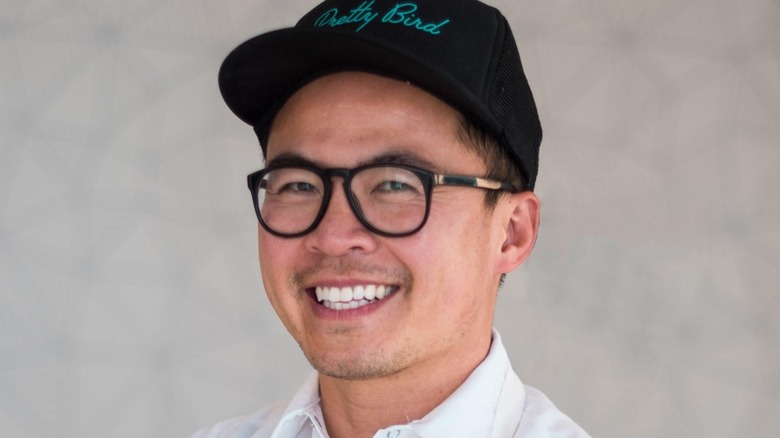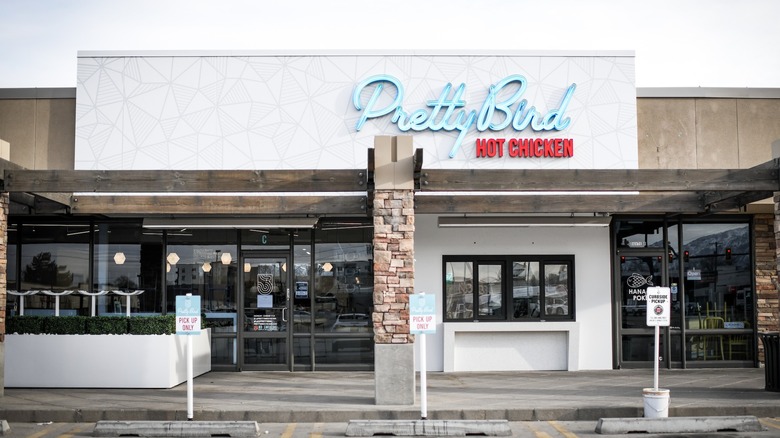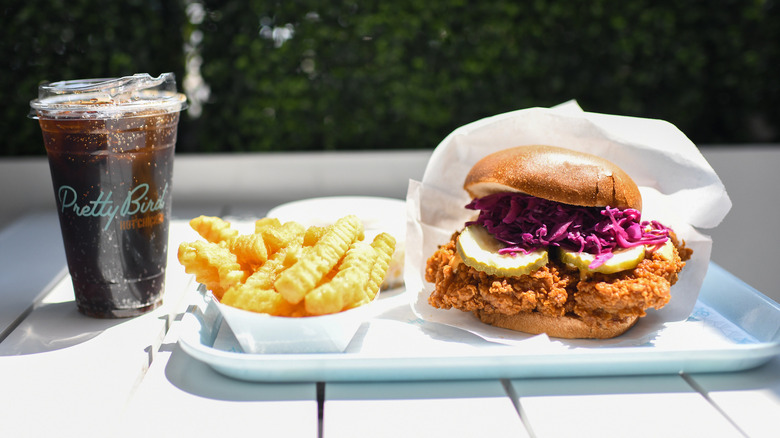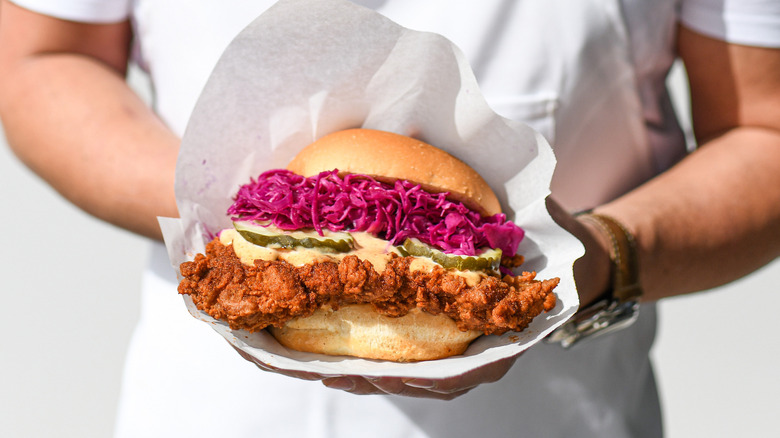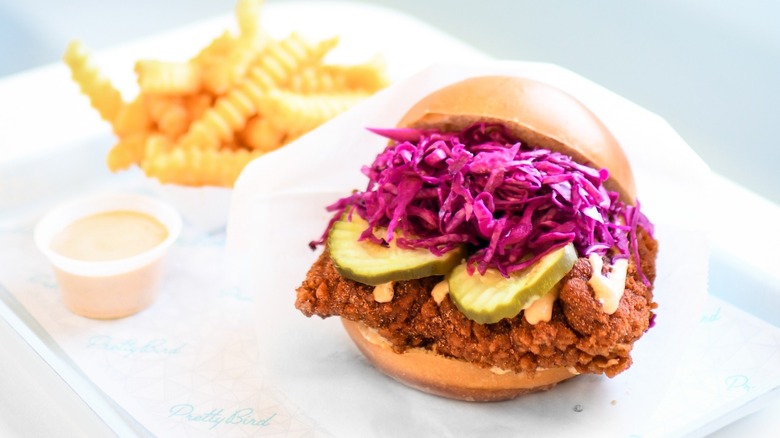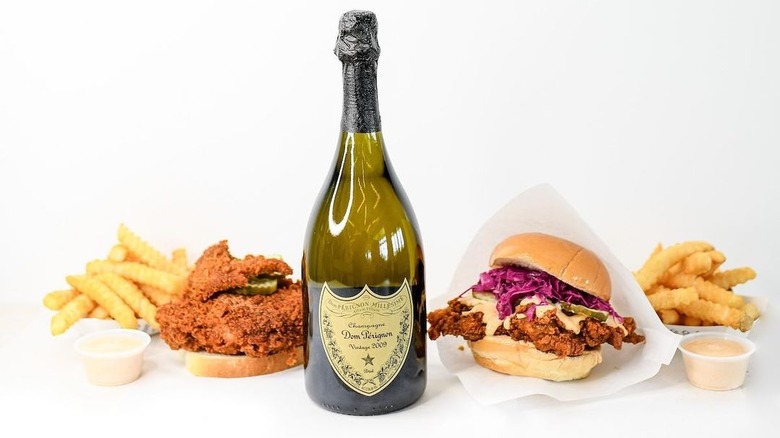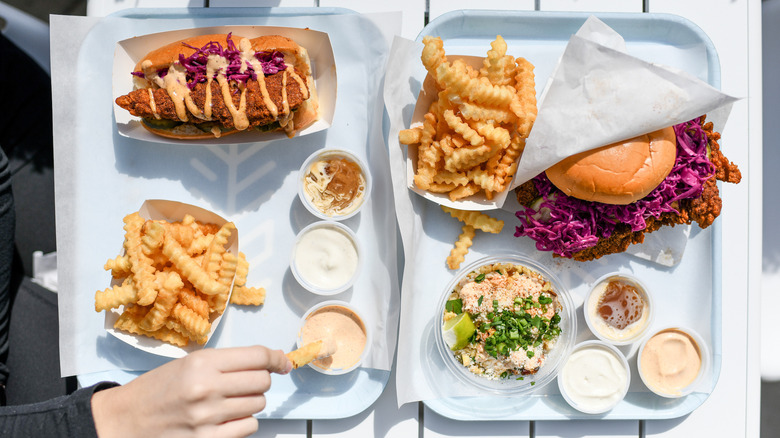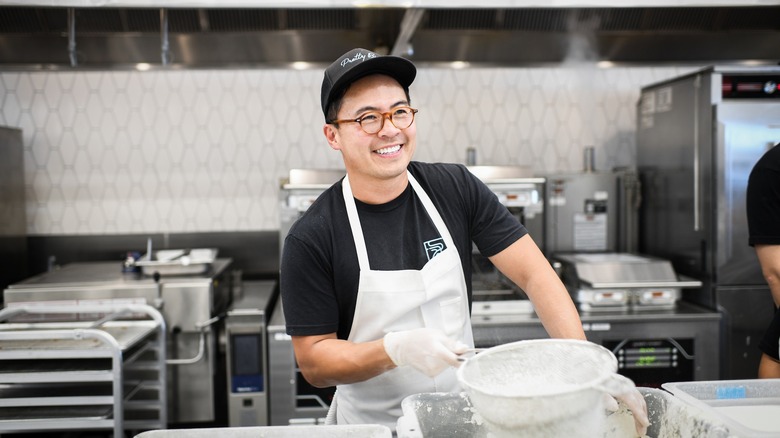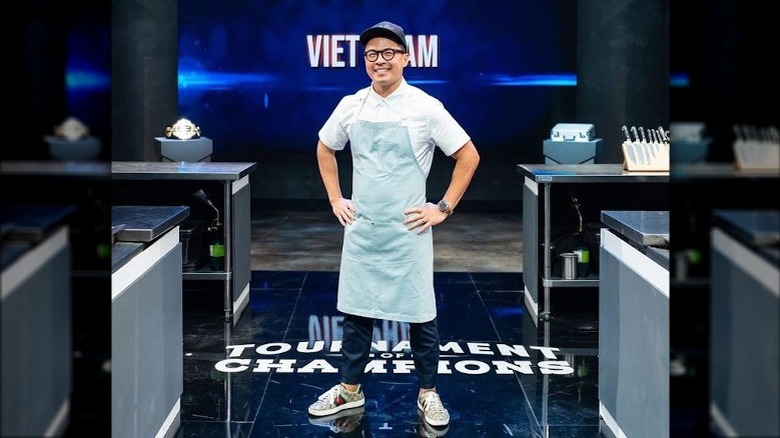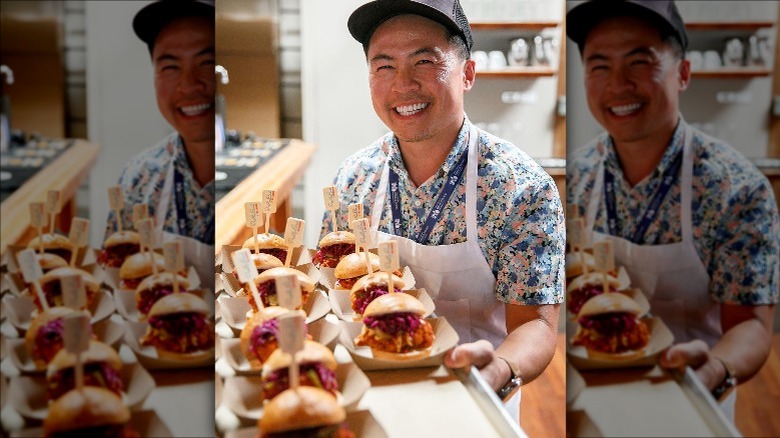Chef Viet Pham's Culinary Journey Through Fine Dining, Food Network, And Fast Casual - Exclusive Interview
To say Viet Pham has an impressive résumé would be an understatement — his accolades include being named one of Food & Wine's best new chefs and getting recognized multiple times by the James Beard Foundation, not to mention being the only chef to defeat Bobby Flay in the kitchen on several separate occasions. The formally trained chef has worked in Michelin-star restaurants, run his own award-winning fine dining establishment, and appeared in a range of Food Network competitions throughout his career.
Now, he's channeling all those culinary chops into perhaps the last thing one would expect: Nashville hot chicken. This iconic Southern staple is a far cry from the elevated, epicurean pursuits of Pham's past, but that's exactly what drew him to it in the first place. Bringing his unique, upscale approach to this down-home comfort food, Pham is taking Salt Lake City by storm with Pretty Bird Chicken — and things are only looking up from here.
We recently caught up with Chef Pham to talk all things hot chicken and more. Speaking exclusively with Tasting Table, Pham opened up about the career path that took him from the world of traditional fine dining to his increasingly successful fast casual concept. He also broke down the secrets behind his famous recipe — a dish that helped him beat Bobby Flay — looked back on his culinary competition experiences, and shared the big plans he has for the future.
How Pham's fine dining experience led to fast casual success
Given your culinary background and the fine dining-focused establishments you've worked at in the past, what inspired you to venture into the fast casual space with Pretty Bird Chicken?
I went to school with the idea of working in the best restaurants, and that was my goal. I worked with Laurent Gras for a while and learned a lot from him, and eventually opened up my own restaurant called Forage, which was one of the first tasting menu restaurants in Salt Lake City in 2009. I love all of the disciplines, the principles of fine dining. But as I matured as a chef, I started to realize there's so much with fine dining that I didn't like. To me, there's nothing more pretentious than to put a plate down and explain why they should eat it and this whole narrative behind it. I got tired of that. I felt like doing fine dining — at least, living in Salt Lake City — was not going to be sustainable in the long run. For me to be successful financially, I had to figure out something that was scalable.
In 2013, I was in LA filming "Food Network Star," and I only made it halfway. Once you get eliminated from the show, they transfer you to another hotel, and you're there until they're done filming the show. During that time, I ate my way around LA, and for the first time, I got to try some hot chicken. When I took a bite of this fried chicken for the first time, it blew me away — the complexity, the spices, the sweetness of it. I told myself, "I'm going to open up a fried chicken restaurant one of these days."
From 2013 to 2018, I spent a lot of my free time trying to replicate those flavors. I literally drove around town with two turkey fryers in the back of my Prius, willing to feed whoever was willing to give me feedback. After five years or so, I opened up Pretty Bird. What makes Pretty Bird great is it was built on the principles of fine dining. There's a methodical practice that goes to everything. But at the end of the day, you get something that is familiar. I don't have to tell you a whole story behind the ingredients — I'm just giving a fried chicken sandwich to somebody. They see it, they know exactly what it is, they eat it, and they love it because of the complexities and all of the flavors and textures. Having a deep understanding of fine dining and being able to apply those principles to something that's very simple is what drew me to this sector of the restaurant world.
What sets Pretty Bird's hot chicken apart from the rest
How did you develop your own unique recipe for Nashville hot chicken?
Early on, it was based on the recipe that I was trying to rebuild from memory, and that was the chicken that I had in Orange County. I knew that it was vinegar, honey, and a bunch of spices. I started to build this up through the years, taking spices away, [using] whatever feedback people would give.
About six months before Pretty Bird opened, I actually got to visit Nashville for the first time, and the first hot chicken I had was from Hattie B's. Then I went to Bolton's Hot Chicken. I went to Prince's Hot Chicken, Pepperfire, 400 Degrees, and I tried them all. The chicken is really good; it's moist. However, Nashville hot chicken tends to be very singular. It's varying levels of heat and it's good, but heat can overpower everything, so it was, "How do I combine those flavors from the spices as well as heat and balance it?"
You can buy Carolina Reaper or any other type of pepper powder and add it to food and make it super hot. The skill and the discipline is being able to understand certain peppers and how they burn, applying that to certain spices, and finding that equilibrium where the heat isn't overpowering the spices. A lot of hot chicken places will tend to use Carolina Reaper because it's the hottest. However, the way that Carolina Reapers burn on your palate, it's like cayenne. It's right up front.
We don't use Carolina Reaper in any of our spice mixes. We use ghost chili pepper because it tends to burn from the back and comes to the front. That's great because the first couple bites that you eat, you get to taste all the flavors, you get to feel the textures, and then the heat comes. If we had used Carolina Reaper, you would've felt the burn in the beginning, and then all the hard work that gets put into the sandwich basically is for nothing because the heat has overpowered everything. We also want craveability, that element where people want to come back for more. The combination of heat and flavor profiles and textures is the winning combination that makes Pretty Bird so great.
Viet Pham's secrets for crunchy, juicy, Bobby Flay-besting fried chicken
This chicken has not only gotten national acclaim, but it's also what helped you beat Bobby Flay a second time. Outside of balancing the heat, what else can you share with me about how this chicken is prepared to achieve the perfect flavor and texture?
[When] I first started doing these sandwiches, 99% of the places selling fried chicken sandwiches were all using boneless, skinless chicken breasts. I opted to use chicken thighs because it's more succulent; it's juicier.
We do a dry brine, a combination of white pepper, sugar, salt, and we add a tiny bit of buttermilk, which binds it all together. We only use a little bit of it so that it coats all the chicken evenly. It brines for about 18 hours, and the chicken gets pressure fried.
You can open fry or you can pressure fry. When you open fry, you tend to get more of a chicharron flavor and that crackly, crispy skin, whereas [with] pressure frying, you don't get so much of that because there's so much moisture that's contained in the pressure fryer, but you get consistent juicy chicken. Nowadays, [some] pressure fryers allow you to do both. After we pressure fry, there's a setting that allows us to release all of the pressure, and it fries for an additional minute to give that open fry effect.
What are the most important things to keep in mind when making perfectly crispy hot chicken at home?
It's all in the dredging process and how hot your oil is. We use a combination of all-purpose, self-rising flour, and we also use corn starch. Flour provides the crunchiness, whereas the starch provides a backbone crispiness.
When you dredge your chicken, you coat it with some buttermilk or egg so the flour sticks. But more importantly, before you start off dredging your chicken, you have to add some type of liquid back into the flour mixture. Then work that flour mixture in your hand until you get little tiny pea-size clumps. It's super, super crucial that you do this. The ratio that you're looking for is roughly 30% of that crumb and 70% of the flour. That way, you get a nice, perfect crust, but you also get all those nice craglies that soufflé when you fry it, and that's the perfect piece of chicken. If you were to take the chicken and dredge it in flour and cornstarch without adding buttermilk to the flour, you would end up with just the shell. It doesn't have much texture. It'll become soggy fast.
Then, [make] sure that your oil — if you're frying at home on a stovetop — is at least 350 degrees. Don't overcrowd your pan; otherwise, your product's going to be super greasy.
Hot chicken isn't complete without the perfect sauce to complement the spice
What is the key to a perfect sauce to complement the signature and spicy taste of Nashville hot chicken?
Nashville is famous for its comeback sauce. It's a combination of mayonnaise, a bunch of spices, and maybe a little bit of buttermilk to loosen it up. It's good, and it's something that's been historically done with hot chicken for a very long time. We have our Pretty Bird sauce, which is literally our workhorse sauce. This sauce is a buttermilk-based sauce and mayonnaise. However, what makes it different is that literally every batch that gets made, we put in 10 pounds of lemon juice and lemon zest. It adds an acidity that's really refined.
Usually when people add acidity, they'll add vinegar, [or] lemon juice has that nice pop that's refreshing. We add fish sauce to our sauce and a combination of spices that's similar to some of our spice mixes that we shake onto our chicken. You look at the sauce and it seems heavy, but when you eat the sauce, it balances out the whole entire chicken.
A lot of people that do fried chicken sandwiches, they'll use a brioche bun, they'll have a piece of fried chicken that they dunk in oil, and they'll put [that spice oil] on the brioche bun, and they put tons of sauce, and they'll put tons of creamy slaw. That's an oversaturated sandwich that's too fatty and not balanced. At Pretty Bird, we do a cider slaw, and our sauce is acidic, but it also has that creaminess to tie everything in. You're eating fried chicken, and it's already a heavy product. You don't want to walk away feeling heavy.
The champagne and chicken combo you didn't know you needed
I've got to ask — how did the Dom Pérignon combo end up on the menu?
It was my wife's idea. I always knew that I wanted to do something over the top. One of the items that we wanted was caviar, but in this market, no one's going to want to shell out a hundred bucks for 30 grams of caviar. At the same time, caviar isn't very shelf stable. We can't keep it for several months, so we figured the next best thing is to pair with champagne. Subtly spiced fried chicken and champagne go really well together.
The next step is, what over-the-top champagne can we use that people are actually familiar with? I wanted to personally use Krug, but the younger generations aren't familiar with Krug. However, they are familiar with Dom Pérignon because of the image of it in rap songs and all that stuff.
My wife goes, "We should call it the Dom P and the Pretty B," and it rhymes, so that's how it came to be. Believe it or not, we actually sell a lot of it. We don't mark it up at all — we sell it for $240 or $250 for a bottle plus two meals, so it's a heck of a deal because you're buying the Dom P at cost, basically.
What are the best cocktails to pair with fried chicken and hot chicken?
Cocktails that have a little bit more sweetness and acidity — they tend to pair hot chicken with honey [in the South]. The honey actually mellows out the spices. We're the number one seller of a wine called House Rosé. It's a sparkling can. The reason why it goes so well is because there's residual sweetness that helps with the spices. If I were to do a cocktail, I would do something that's citrusy, something that is slightly sweet, but not too sweet.
Viet Pham has some pretty big plans for Pretty Bird Chicken
What else is in store for Pretty Bird? Can you share more about plans to expand?
One of the hardest things about this business is quality and consistency. Back when I was in fine dining, it was easy to find career-oriented people that wanted to become chefs. The difference between that and now is that as much as I hype up how great our chicken is and the processes behind it, we're a fast casual restaurant. We get people [from] all walks of life and people with very little experience. The most challenging part for me is trying to dumb things down and make it a lot easier so that people can replicate it. The goal is to lock down these systems and eventually grow cross-country. I would love to grow this to 10, 15 stores, but right now, it's just one day at a time.
I would love to do a fine dining spin-off of a Pretty Bird one day where we do things slightly different, we give people more of a catered type of service, something that would be refined and fun — maybe more offerings of champagne, a more elevated offering of Pretty Bird. There's a lot of ways that we could make Pretty Bird even fancier, but at the end of the day, it needs to be for everybody.
Pham's unique culinary heritage
Your background is something that you have proudly shared throughout your career. How does your upbringing show up in your cooking style today?
I don't cook any Vietnamese food. I only started using Asian ingredients, specifically Vietnamese ingredients, in the last decade. As you get older as a chef, you start to find more meaningful inspirations behind your dishes. When you first start off, you're copying other chefs. You're doing what's trendy, and now you're focusing on things that are relevant to you, your upbringing.
As a kid, my mom always said, "Fish sauce makes everything better," but to me, fish sauce was absolutely vile. It was stinky, it was horrible, and it's something that I never wanted to use. But with self-restraint, understanding how it's made and how it's used, it can make bland dishes taste amazing. Fish sauce is the one ingredient that has become my identity and my upbringing that has been put into our dishes. The funny thing is that fish sauce isn't even an Asian ingredient — it was originally a Greek ingredient that got spread through the spice trade routes.
At this point, would you say you have developed an appreciation for Vietnamese food?
Growing up, I wanted to be more American than I wanted to be Vietnamese — because my name is Viet, my brother's name is Nam, and growing up in the suburbs of Illinois in the early '80s, we got picked on a lot. We were the only Asian kids, so I wanted to do whatever I can to be more American. I wanted to change my name. I wanted to eat more McDonald's because the more I ate of that, the more American I felt. But now that I'm older, my heritage is my sense of identity; it's who I am. I try to incorporate as much of that into what I do, whether it's the story, the delivery, or the ingredients.
What's your favorite Vietnamese dish?
My favorite Vietnamese dish is báhn xèo, which is the Vietnamese sizzling crêpe.
What it's like to beat an Iron Chef – twice
There are countless chefs who have put it all on the line to try and beat Bobby Flay. How does it feel to have done it multiple times?
I am the only chef with the distinction of beating him at "Iron Chef," "Beat Bobby Flay," and then beating "Bobby's Triple Threat." It's amazing. I grew up watching "Iron Chef Japan," the original one, so it was a big part of my childhood. When I heard that I was going to be on "Iron Chef America," I flew my parents out with me. They were in the audience, and it was already a win.
Originally, I wanted to go against Morimoto. I didn't find out that I was going against Bobby Flay until the day of. We were actually walking into the kitchen. I was disappointed, but now that I look back, Bobby Flay was more of a household name at that time. To be able to beat him, not once, but twice, is awesome. He's one of the few chefs on TV that I truly respect because he understands cooks.
What is he like when you're competing against him?
Bobby is very cool, calm, and collected. The producers always encourage us to do a little bantering back and forth, but Bobby knows his [stuff]. At the same time, he makes you feel welcome, especially on "Beat Bobby Flay," but on "Iron Chef America," you just go. During that whole hour of cooking, I looked up and saw him maybe twice.
Pham is more than ready to keep learning and competing
You recently competed on "Tournament of Champions," and you were defeated by Tiffany Derry. What did you learn from that experience?
These cooking competitions — it's all a game. With Guy Fieri, his "Tournament of Champions" is a cracked-out version of "Guy's Grocery Games." The biggest takeaway from this is when you're given 30 minutes to cook four dishes, you can't overthink things. 99% of the time, the first thing that pops up in your mind is what you should go with. Obviously, practice helps. This is Tiffany's second or third season on "TOC," and it was my first season, so she has a better understanding of time management and doing what you need to do to impress the judges. Sticking with what you know and giving them lots of flavor punches is what will allow you to have an advantage.
Let's say you're able to pick the next chef you compete against. Who's it going to be?
I would love to cook against Nate Appleman ... He was the one that was the corporate chef for Chipotle. He won a James Beard. I have so much respect for the guy and his career and what he did ... I would love to cook against Jet Tila, and I would love to cook against Tiffany again. Maybe they'll call me back for the fifth season.
Delicious dreams for the future
Your cooking repertoire spans global cuisine. Do you have any other culinary pursuits in mind for the near future outside of Pretty Bird?
One of my dreams is to build a fine dining kitchen [with] a tasting table. Aside from doing videos for social media or doing testings for Pretty Bird, I can cook at the level that I used to cook. That's the one thing that I miss the most right now. Where I'm able to be creative is to get back into the kitchen and cook at that higher level again.
Aside from that, I'm working on another concept called Pretty Q. Originally, it was going to be a barbecue place. What I'm doing is smoked meats. Growing up in Illinois, one of my favorite things to eat every Friday with my family was Portillo's, which is an Italian beef sandwich place. I thought, "What if I do something similar to Portillos? I could do pork, turkey, beef, but smoke it and make an Italian hot beef sandwich." That idea came on about two years ago, and I was looking for spaces earlier last year. I decided to hold off this past fall because I want to see how this economy rides out in the next six or eight months, but that's the next project.
Click here to learn more about Pretty Bird Chicken, and keep up with the latest from Chef Viet Pham on Instagram.
This interview has been edited for clarity.
